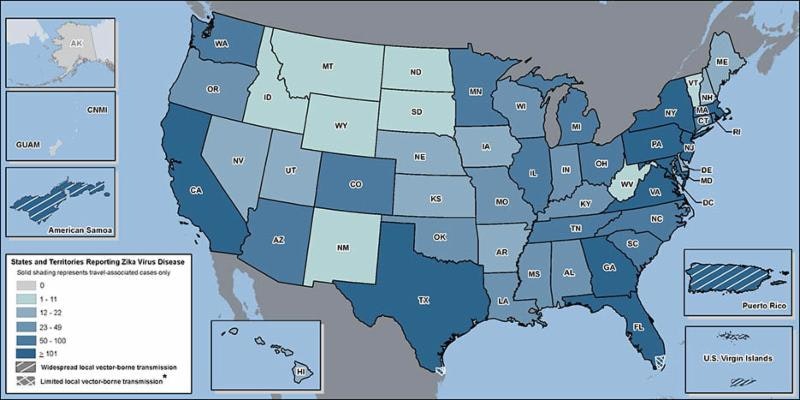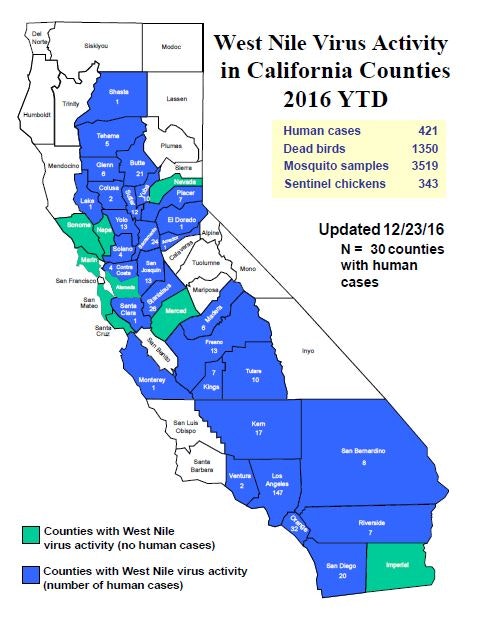Winter 2016 Newsletter
Quarterly Newsletter and Updates Winter 2016

Mosquitoes during the winter?
With many adult mosquito populations becoming less active as the rains set in, it may seem like mosquitoes are not a problem in Alameda County during the winter months. However, our temperate climate allows a few species, such as Culiseta incidens (a mosquito which develops in relatively clean water), to remain active year round. On the other hand, several species native to our county are primarily found during the winter months. Culiseta inornata is a large mosquito with females that actively bite throughout the winter. As such, this mosquito can currently be found in all stages of its life cycle. Eggs of Aedes sierrensis, Aedes squamiger, and Aedes washinoi (all native Aedes mosquito species) begin to hatch as rainwater fills up marshes, heavily vegetated depressions, and tree holes. Larvae of these mosquito species are currently developing and adults will begin to emerge as spring approaches. Since mosquitoes can be found year round in Alameda County, it is important to continue to drain or cover any standing water. After a rain event is a great time to walk through your yard and search for areas with standing water. If you need help knowing where to look, our backyard checklist is a great place to start.
Zika Virus
Local transmission of Zika virus has occurred in both Florida and Texas (the small striped areas on the map below). These are the only known locations where the virus has been spread in the United States. Although there are many communities in California where the mosquitoes capable of transmitting Zika have been found, the disease has not been spread locally. Hundreds of California residents have acquired Zika virus in 2016 while travelling abroad so it is important to always protect yourself from mosquito bites wherever you may be.

What you can do to help keep invasive Aedes mosquitoes out of Alameda County:
- Inspect your yard regularly and remove any clutter or containers that may hold water.
- If you store water, make sure all containers are tightly covered to keep mosquitoes out.
- Scrub outdoor containers that have held water with hot, soapy water to kill any potential mosquito eggs.
- Wear mosquito repellent when spending time outdoors.
- Do not bring home items that have held standing water (tires, containers, plants, e.g. bromeliads, bamboo, etc.) from areas with invasive Aedes mosquitoes. Click here to see areas in California with invasive Aedes. To see the potential range of invasive Aedes mosquitoes in the United States click here.
If you will be traveling to an area with Zika virus:
- Use insect repellent. Look for these ingredients: DEET, picaridin, IR3535, Oil of Lemon Eucalyptus, or para-Menthane-3,8-diol (PMD). Reapply often, as directed on the product label. Remember to apply sunscreen first and then insect repellent.
- Cover exposed skin when possible.
- Stay and sleep in screened-in or air-conditioned rooms. Use a bed net if you're sleeping outside.
- Watch for symptoms after you get home.
- Call your doctor immediately if you suspect Zika.
- Use insect repellent for 3 weeks after travel.
- Use condoms when you have sex for at least 6 months.
Pregnant? Trying to conceive?
Zika is linked to birth defects. Pregnant women should consider postponing travel to any area with Zika. If your male partner travels to these areas, either use condoms or don't have sex for the rest of your pregnancy.
Additional Resource from the CDC
West Nile Virus*

West Nile virus (WNV) activity typically begins to slow down as the winter months approach. In Alameda County, a total of 11 birds (all American crows) and 2 mosquito samples tested positive for WNV in 2016. These numbers are both significantly lower than 2014 and 2015 totals. Reporting dead birds to the West Nile virus hotline (877-WNV-BIRD) is closed for the winter but will open again in the Spring. Internet reporting for dead birds is available year round at http://www.westnile.ca.gov/report_wnv.php. Dead bird reports are crucial to our WNV surveillance program in Alameda County. In a normal year we Statewide a total of 1,350 dead birds, 3,519 mosquito samples, 343 sentinel chickens, and 421 humans have tested positive for WNV. Eighteen WNV related human fatalities have also been reported. The totals for California's WNV activity are updated weekly and can be found at www.westnile.ca.gov.
*Data as of December 23, 2016
Alameda County WNV Activity
Quarterly Numbers

Upcoming Events
- Hart Middle School STEAM night (Thomas Hart Middle School, Pleasanton) - January 19th, 6pm-8pm
- Alameda County Spring Home & Garden Show (Alameda County Fairgrounds) - February 17th, 18th, and 19th
- Dublin St. Patrick's Day Celebration (Dublin Civic Center) - March 18th & 19th
